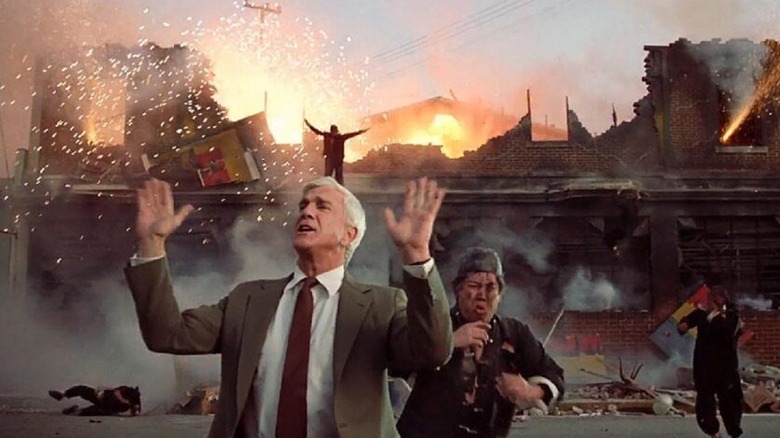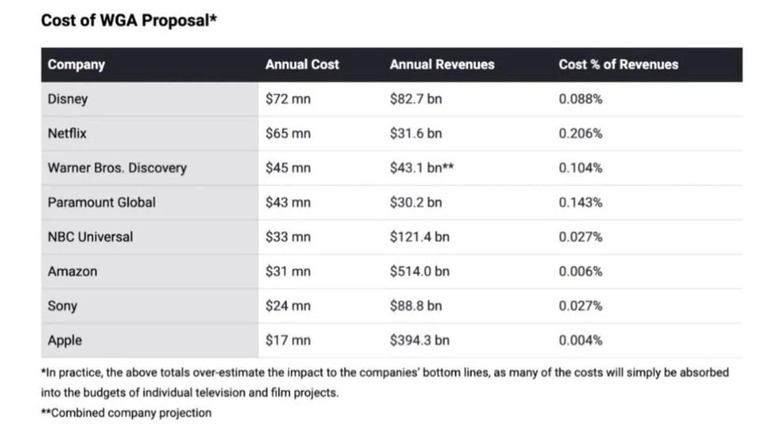Warner Bros. Discovery Takes One-Quarter Loss Larger Than Entire Industry Cost Of WGA Proposal
For those keeping track at home, we've officially hit the "Utter nonsense" portion of the ongoing WGA and SAG-AFTRA strikes — and, as has been the case since the start, there's nobody else to blame but the studios. Their representatives, the AMPTP, have thus far resorted to some of the most underhanded and casually cruel methods to maintain their iron grip on the billions of dollars of profits generated by the film and television industries. From obstructing picket lines and creating unsafe environments for those on strike to unmasking themselves as straight-up supervillains by threatening to literally starve writers out and force them to lose their homes before coming back to the bargaining table, the studios seem intent on proving that there are simply no depths they'll refuse to go to.
With such scorched-earth methods clearly dictating the overall negotiating policy of the studios, one would assume that this has been a typical case of following the money. In other words, only from a cold, calculating, bottom-line-at-all-costs perspective could such extreme actions ever be justified ... right? Well, a new report indicates that even this would be giving the AMPTP a little too much credit, incredibly enough.
According to Variety, the David Zaslav-led Warner Bros. Discovery (who hasn't exactly been a stranger to controversy) recently put solid numbers to the studios' claims that the strikes have been costing them hundreds of millions of dollars. For this past quarter alone, the studio revealed a whopping estimated loss of between $300-500 million. With such mind-boggling deficits in play, surely the "disturbing" and "not realistic" demands (in the words of Disney CEO Bob Iger) of the unions would be far more exorbitant than that. Not quite! Had the AMPTP simply reached a fair and reasonable deal, to begin with, they could've saved money.
The numbers tell the story
Look, I freely admit I have absolutely zero business sense and an extremely tenuous grasp of financials (and, uh, math in general). That said, nobody needs a PhD to figure out what's been obvious right from the beginning. There is simply no scenario where the AMPTP continuing to drag these strikes out for months and months becomes more cost-effective than simply paying what the writers and actors, the lifeblood of the entire industry, genuinely deserve. Here are the numbers to prove it.
Previously, the WGA has helpfully released a handy graphic (seen above) that puts their demands in proper context. When considering the hundreds of billions of dollars that the studios and streamers are raking in on an annual basis, everything that the writers in particular are asking for all but pales in comparison. Should the guild receive every single concession that they're negotiating for (which almost certainly won't happen, as any instance of collective bargaining typically requires some level of compromise on both sides, for better or worse), the cost of their proposal wouldn't even make a dent on the studios' respective bottom lines — less than 1% combined, in fact.
To put it in even more stark terms, the annual cost of each of the major studios would amount to $330 million total — or around the minimum estimated quarterly loss that Warner Bros. Discovery just reported. In an ideal world where the AMPTP had accepted the WGA's terms and prevented this prolonged shutdown, they could've avoided upwards of half a billion in losses, the suffering of countless below-the-line workers, and untold repercussions of having major upcoming movies and shows delayed indefinitely. But, you know, that would've made too much sense, apparently.
Stay tuned to /Film for continuing updates on the strikes.

